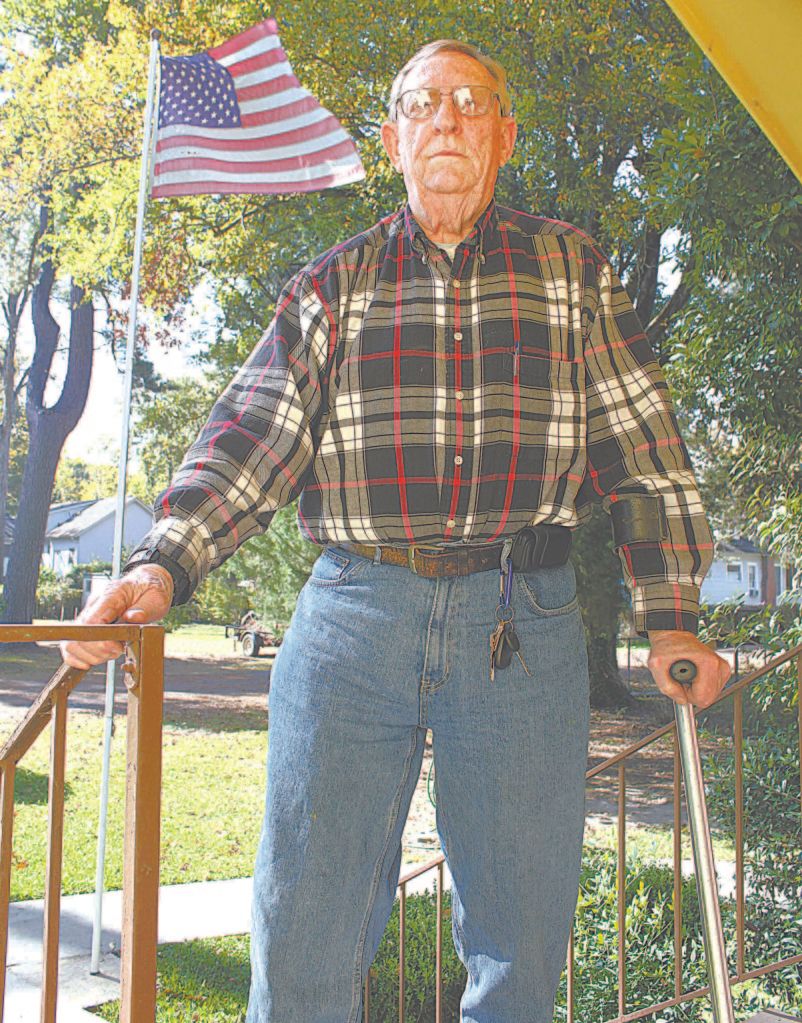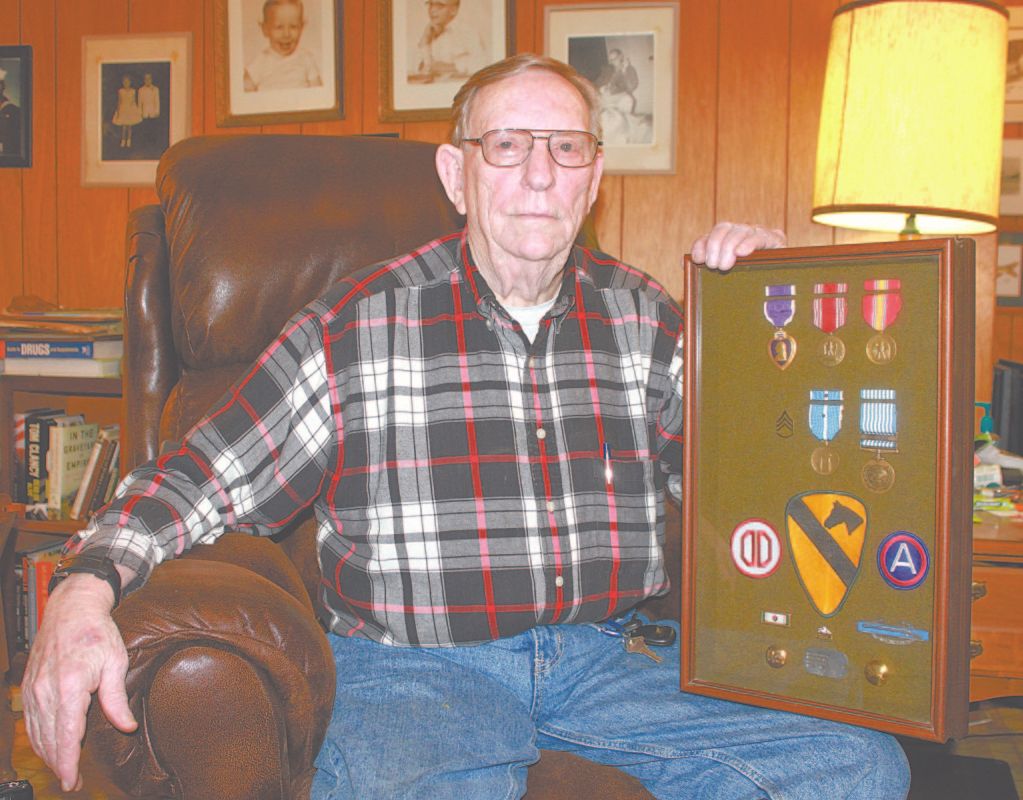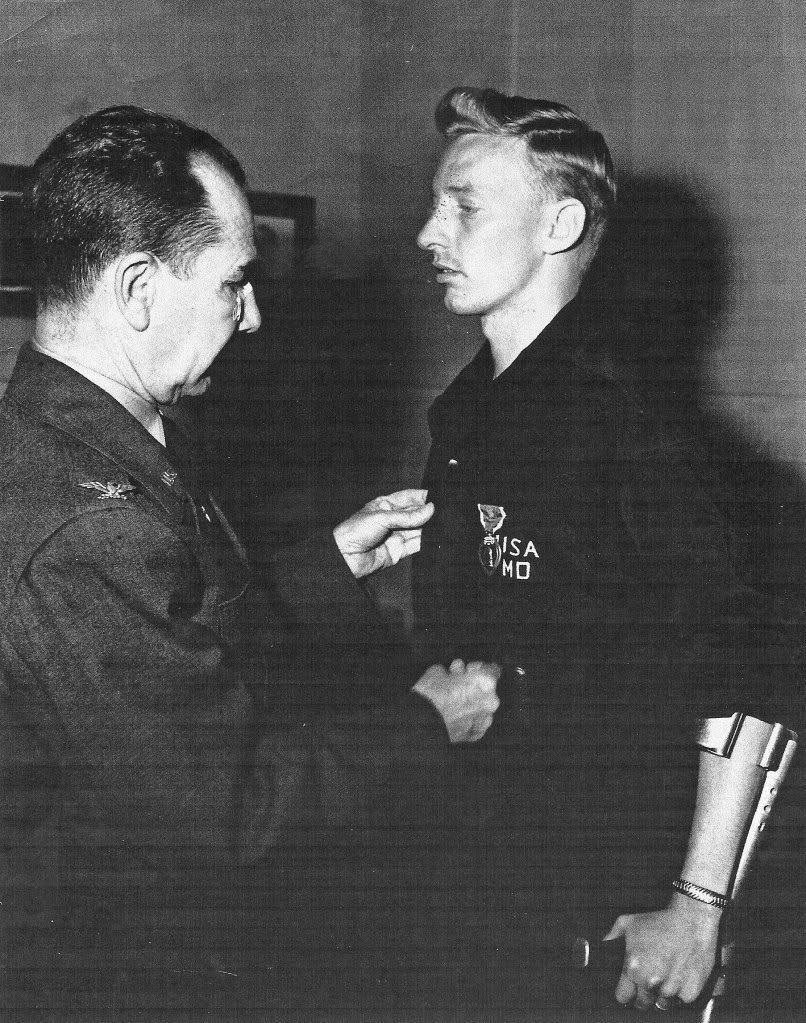Cricket
Practically Family
- Messages
- 520
- Location
- Mississippi
Being managing editor at our hometown paper, we decided to do a five part series on local veterans in honor of Veteran's Day. I would like to share two of those with the Lounge. I will post the others when they publish next week. I found their stories remarkable, and I hope you enjoy reading them as much as I did meeting them.
SHARBROUGH SURVIVED MOTAR HIT WHILE SERVING IN THE KOREAN WAR
By JAMIE PATTERSON
Managing Editor
Overshadowed by World War II and Vietnam, the Korean War is often referred to as The Forgotten War.
But William C. “Red” Sharbrough will never forget his time in Korea. His walking brace and head full of memories remind him everyday.
Looking through a gift bag he received in honor of Veteran’s Day, Sharbrough admits the Korean War is often overlooked. That makes every gift, card and personal thanks all the more special to him.
“The card means the most,” he said, smiling as he put his gift bag away.
A Purple Heart recipient, Sharbrough was wounded during his short time in combat. He served in Korea for seven weeks, two days. But he has lived with the aftermath of war well after his wounds healed.
Sharbrough joined the National Guard in Yazoo City after graduating from high school. He had also served three years at Chamberlain Hunt Academy in Port Gibson.
“I learned everything I knew at knew at Chamberlain,” he said. “There was a hard Marine drill instructor there, but he probably saved my life. He taught us a lot.”
Serving with Company D of the National Guard, Sharbrough was at an Alabama camp when he heard North Korea invaded South Korea.
“We were then told we were basically going to be inducted into the Army,” he said. “By late December, we found out we were going to Fort Jackson in South Carolina.”
As part of the Dixie Division, Sharbrough said a group of draftees were sent to “feel them out.”
“We had to teach them what to do,” he laughed. “Some of those boys didn’t know how to hold a rifle. I remember most of them came from coal country in West Virginia.”
Sharbrough was able to return home for a period of time with his wife, Annie Lois, and their baby.
“They called me to come back in,” he said. “Two weeks later, I was with a draft of about five or six.”
Sharbrough arrived at a San Francisco Army base. It was there that he would head to the Pacific islands.
“I got on a ship for 11 or 12 days going to Japan,” he said. “I stayed in Japan for about three days before we went into Korea.”
Sharbrough entered the divided country one year after General Douglas McArthur’s arrival.
With a 40-foot tide, Sharbrough remembers the intense journey from the ship to the shore.
“We got off the ship and onshore, and then the ship got out of there,” he said. “With 40 feet of water going up and down, in a 12-hour period, that’s a lot of water.”
Sharbrough arrived at the Kimpo Air Force base when he ran into a familiar face. Amidst the hustle and bustle, it was good to see someone from home.
“I ran into Otis Wilkinson,” Sharbrough smiled. “He was telling everyone where we were going.”
Passing the 38th parallel, or the dividing line for Korea, Sharbrough began moving in and around Old Baldy, which was a prominent hill that earned its nickname after artillery and mortar fire destroyed the trees on its crest.
It was there that he ran into another familiar face, one that showed the signs of battle.
“While moving from one position to another, I came across Breezy Baker, a friend of mine from Greenwood who got us an apartment in South Carolina,” Sharbrough said.
The reunion was short, but it had the markings of war.
“He had been hit the night before,” Sharbrough said. “He wore glasses, and they were cracked. His nose was scraped clear across the front where shrapnel had hit him.”
Sharbrough moved out the next day with two platoons. It was a day that would scar him for the rest of his life.
“There was a small place that China had already come in and dug trenches around,” he said. “We got hit there that night. That’s when the mortar hit me.”
Sharbrough takes a quick glance down at his leg.
“I left the next morning, and it took me two days to get back to Seoul,” he said. “That was where I got my first medical attention besides first aid.”
It was a difficult and long journey for Sharbrough. Due to foggy conditions, helicopters were unable to land to transport the wounded.
“They hand carried me to the first aid station about two or three miles further back,” he said. “They cleaned me up and added more stints. Then I was put in a Jeep to get back to the railroad.”
Staying in Seoul for about five days, Sharbrough then flew back to Japan. It would be ten more days before he returned to the United States.
“I spent three years in a hospital,” he said. “They told me I could be home in six months, but they would have to take my leg off.”
Sharbrough is able to walk with the assistance of a brace. But he still has to cope with bone infections.
Looking over photographs of his time in Korea, there are several moments captured in time where Sharbrough is seen laughing with others. He said he wasn’t able to develop lasting friendships with many of the men.
“I was in the position where I couldn’t make a lot of friendships,” he said. “I had to tell people what to do. Sometimes it was things people didn’t want to do. But I got along with everyone.”
Sharbrough remembers a time when his men were able to share a laugh at his expense. It was well needed at the time with him replacing a sergeant after many in the platoon had been killed.
“We had come to some rice paddies with little levees and water down in them,” he said, already smiling. “I was trying to be sure everybody was doing what they were supposed to do when I slipped. I was told everything went under water except my rifle. It took me a while to live that down.”
Sharbrough was 21 years old at the time of his service in Korea.
“They called me an old man,” he laughed. “I had one man with me who was just 16 years old.”
Even at a young age, Sharbrough knew he wanted to enlist in the military. But his time in the Korean War shaped him for the rest of his life.
He shares his memories with both laughter and moments of pauses. But there is a bond there that he shares with other veterans, crossing every generation gap.
“It’s different for different veterans,” he said. Combat veterans are a lot different from people who never got in combat through no fault of their own. There are different feelings.”
Sharbrough remembers a connection he felt with the uncle of a neighbor, who served as a combat marine during World War II in the Pacific.
“My friend never entered combat because he was with intelligence,” he said. “But his uncle and I could look across the table at each other when everyone was telling war stories. We just knew.”
Sharbrough said he shares that bond with most veterans.
“It doesn’t make much difference what war you were in,” he said. “In any of them, you can get killed or wounded. They always ask you if you were scared. Of course we were. Anybody who said they wasn’t scared was lying or sick in the head.”
Sharbrough said he got his head straight and had his mind made up during his time in combat. And that’s how he survived.
“You just had to make up your mind,” he said. “You might get killed. But if you were to stop and constantly think about it, it would drive you crazy. I just made up my mind.”



SHARBROUGH SURVIVED MOTAR HIT WHILE SERVING IN THE KOREAN WAR
By JAMIE PATTERSON
Managing Editor
Overshadowed by World War II and Vietnam, the Korean War is often referred to as The Forgotten War.
But William C. “Red” Sharbrough will never forget his time in Korea. His walking brace and head full of memories remind him everyday.
Looking through a gift bag he received in honor of Veteran’s Day, Sharbrough admits the Korean War is often overlooked. That makes every gift, card and personal thanks all the more special to him.
“The card means the most,” he said, smiling as he put his gift bag away.
A Purple Heart recipient, Sharbrough was wounded during his short time in combat. He served in Korea for seven weeks, two days. But he has lived with the aftermath of war well after his wounds healed.
Sharbrough joined the National Guard in Yazoo City after graduating from high school. He had also served three years at Chamberlain Hunt Academy in Port Gibson.
“I learned everything I knew at knew at Chamberlain,” he said. “There was a hard Marine drill instructor there, but he probably saved my life. He taught us a lot.”
Serving with Company D of the National Guard, Sharbrough was at an Alabama camp when he heard North Korea invaded South Korea.
“We were then told we were basically going to be inducted into the Army,” he said. “By late December, we found out we were going to Fort Jackson in South Carolina.”
As part of the Dixie Division, Sharbrough said a group of draftees were sent to “feel them out.”
“We had to teach them what to do,” he laughed. “Some of those boys didn’t know how to hold a rifle. I remember most of them came from coal country in West Virginia.”
Sharbrough was able to return home for a period of time with his wife, Annie Lois, and their baby.
“They called me to come back in,” he said. “Two weeks later, I was with a draft of about five or six.”
Sharbrough arrived at a San Francisco Army base. It was there that he would head to the Pacific islands.
“I got on a ship for 11 or 12 days going to Japan,” he said. “I stayed in Japan for about three days before we went into Korea.”
Sharbrough entered the divided country one year after General Douglas McArthur’s arrival.
With a 40-foot tide, Sharbrough remembers the intense journey from the ship to the shore.
“We got off the ship and onshore, and then the ship got out of there,” he said. “With 40 feet of water going up and down, in a 12-hour period, that’s a lot of water.”
Sharbrough arrived at the Kimpo Air Force base when he ran into a familiar face. Amidst the hustle and bustle, it was good to see someone from home.
“I ran into Otis Wilkinson,” Sharbrough smiled. “He was telling everyone where we were going.”
Passing the 38th parallel, or the dividing line for Korea, Sharbrough began moving in and around Old Baldy, which was a prominent hill that earned its nickname after artillery and mortar fire destroyed the trees on its crest.
It was there that he ran into another familiar face, one that showed the signs of battle.
“While moving from one position to another, I came across Breezy Baker, a friend of mine from Greenwood who got us an apartment in South Carolina,” Sharbrough said.
The reunion was short, but it had the markings of war.
“He had been hit the night before,” Sharbrough said. “He wore glasses, and they were cracked. His nose was scraped clear across the front where shrapnel had hit him.”
Sharbrough moved out the next day with two platoons. It was a day that would scar him for the rest of his life.
“There was a small place that China had already come in and dug trenches around,” he said. “We got hit there that night. That’s when the mortar hit me.”
Sharbrough takes a quick glance down at his leg.
“I left the next morning, and it took me two days to get back to Seoul,” he said. “That was where I got my first medical attention besides first aid.”
It was a difficult and long journey for Sharbrough. Due to foggy conditions, helicopters were unable to land to transport the wounded.
“They hand carried me to the first aid station about two or three miles further back,” he said. “They cleaned me up and added more stints. Then I was put in a Jeep to get back to the railroad.”
Staying in Seoul for about five days, Sharbrough then flew back to Japan. It would be ten more days before he returned to the United States.
“I spent three years in a hospital,” he said. “They told me I could be home in six months, but they would have to take my leg off.”
Sharbrough is able to walk with the assistance of a brace. But he still has to cope with bone infections.
Looking over photographs of his time in Korea, there are several moments captured in time where Sharbrough is seen laughing with others. He said he wasn’t able to develop lasting friendships with many of the men.
“I was in the position where I couldn’t make a lot of friendships,” he said. “I had to tell people what to do. Sometimes it was things people didn’t want to do. But I got along with everyone.”
Sharbrough remembers a time when his men were able to share a laugh at his expense. It was well needed at the time with him replacing a sergeant after many in the platoon had been killed.
“We had come to some rice paddies with little levees and water down in them,” he said, already smiling. “I was trying to be sure everybody was doing what they were supposed to do when I slipped. I was told everything went under water except my rifle. It took me a while to live that down.”
Sharbrough was 21 years old at the time of his service in Korea.
“They called me an old man,” he laughed. “I had one man with me who was just 16 years old.”
Even at a young age, Sharbrough knew he wanted to enlist in the military. But his time in the Korean War shaped him for the rest of his life.
He shares his memories with both laughter and moments of pauses. But there is a bond there that he shares with other veterans, crossing every generation gap.
“It’s different for different veterans,” he said. Combat veterans are a lot different from people who never got in combat through no fault of their own. There are different feelings.”
Sharbrough remembers a connection he felt with the uncle of a neighbor, who served as a combat marine during World War II in the Pacific.
“My friend never entered combat because he was with intelligence,” he said. “But his uncle and I could look across the table at each other when everyone was telling war stories. We just knew.”
Sharbrough said he shares that bond with most veterans.
“It doesn’t make much difference what war you were in,” he said. “In any of them, you can get killed or wounded. They always ask you if you were scared. Of course we were. Anybody who said they wasn’t scared was lying or sick in the head.”
Sharbrough said he got his head straight and had his mind made up during his time in combat. And that’s how he survived.
“You just had to make up your mind,” he said. “You might get killed. But if you were to stop and constantly think about it, it would drive you crazy. I just made up my mind.”





